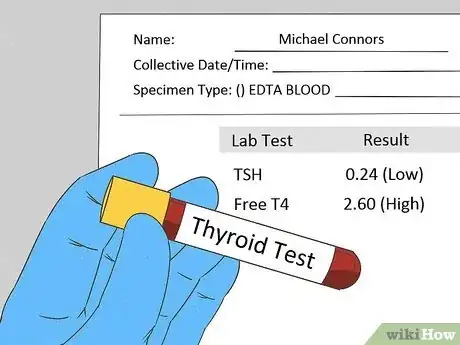This article was medically reviewed by Janice Litza, MD. Dr. Litza is a board certified Family Medicine Physician in Wisconsin. She is a practicing Physician and taught as a Clinical Professor for 13 years, after receiving her MD from the University of Wisconsin-Madison School of Medicine and Public Health in 1998.
There are 9 references cited in this article, which can be found at the bottom of the page.
This article has been viewed 50,134 times.
Weight is a sensitive issue and it can be difficult to bring it up with your doctor. If you're unable to gain weight, or are gaining unwanted weight, it's vital you talk this over with a medical professional. Being at an unhealthy weight can cause medical problems down the road, so do not hesitate to bring the issue up. Be upfront about the fact you want to talk about your weight. Ask your doctor for advice on gaining or losing weight. Provide the right information by being honest about your lifestyle and eating habits. Listen closely to your doctor, follow their suggestions, and get any recommended tests to determine the cause of your weight issues.
Steps
Bringing Up Unwanted Weight Gain
-
1Take initiative to bring up the topic of weight. Doctors are often hesitant to bring up a patient's weight, as it's a sensitive topic and patients sometimes take offense at being confronted about weight.[1] [2] Even if your doctor is concerned, they may hesitate to raise the issue; therefore, do not be afraid to address it yourself.
- It can be intimidating to bring up the subject of weight. If you've gained weight recently, you may feel insecure or embarrassed. Try to remember you should put your health first.
- This is a sensitive issue and should be given the time it deserves. Try to bring it up early if it’s just a regular physical.
- If your doctor doesn't want to make it a priority for a visit, find a new doctor.
-
2Ask the right questions. You want to leave your doctor's office having a full understanding of the impact of weight gain on health, the reasons you're gaining weight, and steps you can take to reverse the process. Make sure to ask thorough, probing questions when discussing weight gain with your doctor.[3]
- Weight gain can increase your risk for a lot of health issues. Ask your doctor if your blood pressure was normal and if they recommend any tests.
- You should also ask your doctor whether you need to lose weight. Ask about how to cultivate a healthier lifestyle through exercise and healthy eating.
- Ask about your risk factors as well. If you've put on weight, you may increase your risk for a variety of health problems.
- If you have a family history of things like heart disease, you may have a greater risk of developing medical complications due to weight gain.
Advertisement -
3Talk to your doctor about any setbacks you might be having. People who find it difficult to lose weight or challenging to maintain a healthy weight may have obstacles preventing them from losing. It is important to explain any setbacks to your physician in order for the doctor to make informed recommendations. [4]
- If your weight gain is sudden and you haven’t undergone any major lifestyle changes, it may be a medical issue. Let your doctor know if your weight gain is inexplicable.
- Your doctor may want to test for something, like a thyroid disorder, to try to determine the cause of your weight gain.
- Medication can also sometimes cause weight gain. Bring up any new medications you’re taking and ask about potential alternatives.
- You may be struggling to maintain a lifestyle that allows for a healthy weight. Talk to your doctor about your stress levels, work life, and personal responsibilities.
-
4Ask your doctor for clarification when necessary. It's very important you and your doctor understand one another. If you're struggling to follow the conversation, do not hesitate to ask a question. Your doctor is invested in keeping you healthy, so they will be happy to clear up any confusion.[5]
- You also may have questions regarding some of your doctor's suggestions. If you're not sure how to make the lifestyle changes your doctor recommends, ask for more specifics.
Talking About an Inability to Gain Weight
-
1Raise the topic yourself. Weight is a sensitive issue, and doctors often hesitate to discuss it with their patients.[6] [7] You may have insecurities of your own regarding your weight. If you feel you need to gain weight, do not hesitate to raise the topic. You need to put your health over your insecurities.
- Unwanted weight loss can be a symptom of a variety of medical ailments, including serious conditions like cancer.[8] Do not wait to see your doctor about this one.
- Make an appointment with your doctor to specifically discuss your weight.
-
2Keep a journal with your observations about your health. There are a lot of roadblocks that may be preventing you from putting on weight. Before the appointment, try keeping a daily journal detailing your eating habits, your moods, your sleeping habits, any medications or supplements you are taking, exercise, and any new or unusual symptoms you may be having alongside your weight loss. This information can help your doctor determine why you are unable to gain weight or point them toward certain tests to run.
- You might notice, for example, that your appetite has decreased since you started a new medication. Your doctor may suggest switching to a different medication or adjusting your dosage.
- Let your doctor know about any stress or emotional issues you’re dealing with. These elements can have a huge impact on your weight.
- If you are having difficulty gaining weight, tell your doctor what you've been eating and about any other symptoms you may be having.
-
3Ask questions. Go into the appointment with a list of questions prepared. You want to make sure you understand how to gain weight in a healthy fashion, and know any potential reasons you're struggling to gain.
- Ask your doctor if they think you need to gain weight. While you may be unhappy with how you look, your doctor may think your current weight is healthy.
- If your doctor thinks you need to gain, ask them for suggestions on healthy ways to do so.
- You should ask your doctor if your issues with weight could be caused by an underlying health condition.
- Ask about your current health. Make sure things like your blood pressure and cholesterol levels are healthy.
-
4Ask for clarification if you don't understand something. Your doctor may use medical terminology you do not understand. They may also go over lifestyle changes too quickly for you to follow. If you're unsure of something your doctor is saying, ask. It's vital you leave the conversation knowing exactly what the game plan is from here.[9]
- You also want to make sure you fully understand any recommendations your doctor offers. If you're confused about something, stop your doctor and say something!
- If your doctor is not willing to go over this information with you, then think about switching to a doctor who is.
Discussing Habits and Routines
-
1Speak honestly to your physician about your medical history. Many patients make the mistake of not being totally honest with their doctor regarding medical history. Medical issues that cause weight gain or weight loss are often related to mental health, and patients may feel embarrassed bringing them up. In order to reach your goal of gaining or losing weight, however, you must be upfront about everything and remain truthful.[10]
- If you suffer from an eating disorder or mental health issue, let your doctor know.
- It can be uncomfortable discussing mental health problems with a doctor and a not a therapist or psychiatrist, but keep in mind your health is crucial.
-
2Talk over your present eating habits. Your doctor will want to discuss your eating habits to determine what your caloric intake is and what it needs to be in order to put on weight or lose weight. Make sure you talk over how often you eat, the items you consume, and any other eating habits.
- Before the appointment, keep a food diary tracking the foods you eat, how much you eat, how often you eat, and the approximate number of calories you consume.
- Mention how many meals you eat a day, whether you snack or not, and what types of food you gravitate towards.
- Do not withhold information. If you have poor eating habits, you may be embarrassed to disclose them to a doctor; however, remember that nothing is more important than your health!
-
3Speak honestly about your lifestyle. Lifestyle is a major factor when it comes to weight loss or gain. You want to be honest with your doctor about lifestyle, even if you feel embarrassed. Do not say you go running regularly if your running schedule is, at best, sporadic. Conversely, if you worry you push yourself too hard at the gym, say so. Admit you sometimes feel physically ill after a workout.
- Let your doctor know how much you exercise. If you do not exercise at all, say so. If you work out two hours a day, admit to this as well.
- You should be honest about other lifestyle factors your doctor may ask about. If you smoke or drink, let your doctor know.
- If you are gaining weight, you may need to exercise more; however, excess exercise can be unhealthy for very slender people looking to gain weight.
-
4Discuss any life stressors you may be dealing with. Many factors can affect a person’s weight and their ability to put on or lose pounds. Strains that you face on a daily basis, or trauma you may have experienced, can directly affect how you gain weight. Speak with your doctor about life stressors to learn whether or not they will have an effect on your ability to put on or lose weight. [11]
- You may not be comfortable opening up to your doctor. Keep in mind you don't have to share details, but you can give vague explanations about your current stress level.
- If you've made any lifestyle changes due to stress, let your doctor know.
Discussing Pertinent Information
-
1See if you need any medical testing. Some conditions and diseases can have a great effect on someone’s ability to gain, lose, or maintain a healthy weight. Your doctor may want to test for certain conditions if you're struggling with unwanted weight gain, or are struggling to gain weight.[12]
- Hyperthyroidism is a condition that can speed up your metabolism and make it difficult to gain weight. Your doctor may request a blood test to check your thyroid.
- Irritable Bowel Syndrome is a relatively common condition that can cause weight loss due to excessive diarrhea and gastrointestinal problems.
-
2Report any medications you are currently taking. Be sure to tell your doctor about any regular use of medications, as this may contribute to unintentional weight loss. Certain medications may also cause you to gain weight.[13]
- Migraine medications, heart medications, antidepressants, and diabetes medications can all affect weight. Let your doctor know if you're taking any of these types of meds.
- Also, talk to your doctor about any non-prescription medications or supplements you take. These may contribute to weight issues.
-
3Report your family history. Your doctor will want to know about your family medical history to determine if any hereditary factors exist that could affect your weight. Share any and all information relative to weight. If there's a history of obesity, thyroid problems, eating disorders, or other weight-related issues in your family, inform your doctor of this.
References
- ↑ http://www.npr.org/sections/health-shots/2011/11/14/142255024/why-doctors-and-patients-talk-around-our-growing-waistlines
- ↑ http://greatist.com/health/talking-to-your-doctor-about-weight
- ↑ http://www.nhlbi.nih.gov/health/resources/heart/healthy-heart-guide-html
- ↑ https://www.urmc.rochester.edu/encyclopedia/content.aspx?ContentTypeID=56&ContentID=DM300
- ↑ http://www.nhlbi.nih.gov/health/resources/heart/healthy-heart-guide-html
- ↑ http://www.npr.org/sections/health-shots/2011/11/14/142255024/why-doctors-and-patients-talk-around-our-growing-waistlines
- ↑ http://greatist.com/health/talking-to-your-doctor-about-weight
- ↑ http://www.mayoclinic.org/symptoms/unexplained-weight-loss/basics/causes/sym-20050700
- ↑ http://www.nhlbi.nih.gov/health/resources/heart/healthy-heart-guide-html





















-Step-14-Version-2.webp)





















































